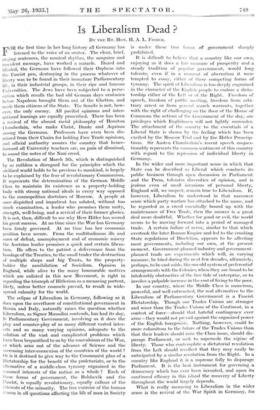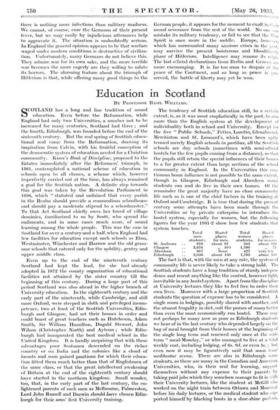Is Liberalism Dead ?
BY THE RT. Hox. H. A. L. }'Isms.
FOR the first time in her long history all Germany has listened to the voice of an orator. The clear, brief, ringing sentences, the musical rhythm, the sanguine and truculent message, have worked a miracle. Dazed and blinded, the Germans have followed their Orpheus into the Fascist pen, destroying in the process whatever of liberty was to be found in their immature Parliamentary life, in their industrial groups, in their ripe and famous Universities. The Jews have been subjected to a perse- cution which recalls the bad old German days centuries before Napoleon brought them out of the Ghettos, and made them citizens of the State. The Semite is not, how- ever, the only enemy. All pacifist opinions and inter- national leanings are equally proscribed. There has been a revival of the absurd racial philosophy of Houston Chamberlain, -who ranks Christ, Dante. and Aquinas among the Germans. Professors have even been dis missed from their Chairs for holding Free Trade opinions, and official authority assures the country that hence- forward all University teachers are, on pain of dismissal, to sound the notes of the Nazi creed.
The Revolution of March 5th, which is distinguished by so ruthless a disregard for the principles which the civilized world holds to be precious to mankind, is largely to he explained by the fear of revolutionary Communism. It represents the determination of the German Middle Class to maintain its existence as a property-holding body with strong national ideals in every way opposed to the cosmopolitan doctrines of Moscow. A people at once dispirited and impatient has saluted, without too much examination, a leader who promises them unity, strength, well-being, and a revival of their former glories. It is not, then, difficult to see why Herr Hitler has scored his great success. At no time since the War has Germany been firmly governed. At no time has her economic position been secure. From the multitudinous ills and sores of defeat, unemployment and of economic misery the Austrian leader promises a quick and certain libera- tion. He - offers to the patriot a deliverance from the bondage of the Treaties, to the small trader the destruction of multiple shops and big Trusts, to the property- holder the annihilation of Socialism. Opinion in England, while alive to the many honourable motives which are enlisted in this new Movement, is right in regarding the triumph of Hitlerism as a menacing portent, likely, unless better counsels prevail, to result in wide- spread calamity for the world.
The eclipse of Liberalism in Germany, following as it does upon the overthrow of constitutional government in Russia and Italy, naturally raises the question whether Liberalism, as Signor Mussolini contends, has had its-day. Is Parliamentary Government, involving as it does the play and counter-play of so many different vested inter- ests and so many varying opinions, adequate to the solution of the vast and -complicated problems which have been bequeathed to us by the convulsions of the War, or which arise out of the advance of Science and the increasing inter-connexion of the countries of the world ? Or is it destined to give way to the Communist plan of a Dictatorship for the benefit of the proletariate, or to the alternative of a middle-class tyranny organized in the assumed interests of the nation as a whole ? Each •of these forms of government, the Bolshevik and the Fascist, is equally revolutionary, equally callous of the interests of the minority. The free exercise of the human reason in'all questions affecting the life of man in Society is under these two forms of government sharply prohibited.
• It is difficult to believe that a country like our own, enjoying as it does a fair measure of prosperity and a steady tradition of popular government, would long tolerate, even if in a moment of aberration it were tempted to essay, either of these competing forms of tyranny. The spirit of Liberalism is too deeply engrained in the character of the English people to endure a dicta- torship either of the Left or of the Right. Freedom of speech, freedom of public meeting, freedom from arbi- trary arrest or from general search warrants, together, with the right of challenging on the floor of the House of Commons the actions of the Government of the day, are privileges which Englishmen will not lightly surrender. The attachment of the country to the essentials of a Liberal State is shown by the feeling which has been excited by the Moscow Trial and by the Hitler Proscrip- tions. Sir Austen Chamberlain's recent speech unques- tionably represents the common sentiment of this country with regard to the repression of individual liberty in Germany.
In the wider and more important sense in which that State can be described as Liberal which conducts its public business through open discussion in Parliament and the Press, tolerates diversities of opinion, and is jealous even of small invasions of personal liberty, England will, we suspect, remain true to Liberalism. If, however, Liberalism be understood in that narrower sense which party warfare has attached to the name, and be regarded as a creed essentially bound up with the maintenance of Free Trade, then the answer is a great deal more doubtful. Whether for good or evil, the world seems to be moving forward into a period of managed trade. A certain failure of nerve, similar to that which overtook the later Roman Empire and led to the crushing State regulations of Diocletian, appears to be affecting Most governments, including our own, at the present moment. Government-planned industry and government- planned trade are experiments which will, in varying Measure, be tried during the next few decades, ultimately, perhaps, to be cast aside, like our old system of preferential arrangements with the Colonies, when they are found to be intolerably obstructive of the free tide of enterprise, or to involve a palpable increase in the cost of-living to the poor.
In our country, where the Middle Class is numerous, powerful, and well entrenched, the real alternative to the Liberalism of Parliamentary Government is a Fascist Dictatorship. Though our Trades Unions are stronger and wiser than the Trades Unions of the Continent, in a contest of force—should that hateful contingency ever arise—they would not prevail against the organized power of the English bourgeoisie. Nothing, however, could be more calamitous to the future of the Trades Unions than that their leaders should raise the Class issue, should dis- parage Parliarrient, or seek to supersede the regime of liberty. Those who contemplate a dictatorial revolution from the Left should recollect that they may easily be anticipated by a similar revolution from the Right. In a country like England it is a supreme folly to disparage Parliament. It is the best instrument for governing a democracy which has ever been invented, and upon its continued efficacy in this island the recovery of Liberty throughout the world largely depends. - What- is really menacing to Liberalism in the wider sense is the revival of the War Spirit in Germany, for there is nothing more infectious than military madness. We cannot, of course, cure the Germans of their present fever, but we may easily by injudicious utterances help to aggravate it. The situation is undoubtedly serious. In England the general opinion appears to be that waged under modern conditions is destructive of civiliza- tion. Unfortunately, many Germans do not believe this. They admire war for its own sake; and the more terrible war becomes the more eagerly are they willing to salute its horrors. The alarming feature about the triumph of Hitlerism is that, while offering many good things to the German people, it appears for the moment to exult in their moral severance from the rest of the world. No one can Mistake its military tendency, or fail to see that the War Spirit is once more in the saddle. Europe, however, which has surmounted many anxious crises in the past, may survive the present boisterous and bloodthirsty phase of Hitlerism. Intelligence may .resume its reign, The last official declarations from Berlin and Geneva are more encouraging. It is far too soon to despair of the peace of the Continent, and so long as peace is pre. served, the battle of liberty may yet be won.

















































 Previous page
Previous page